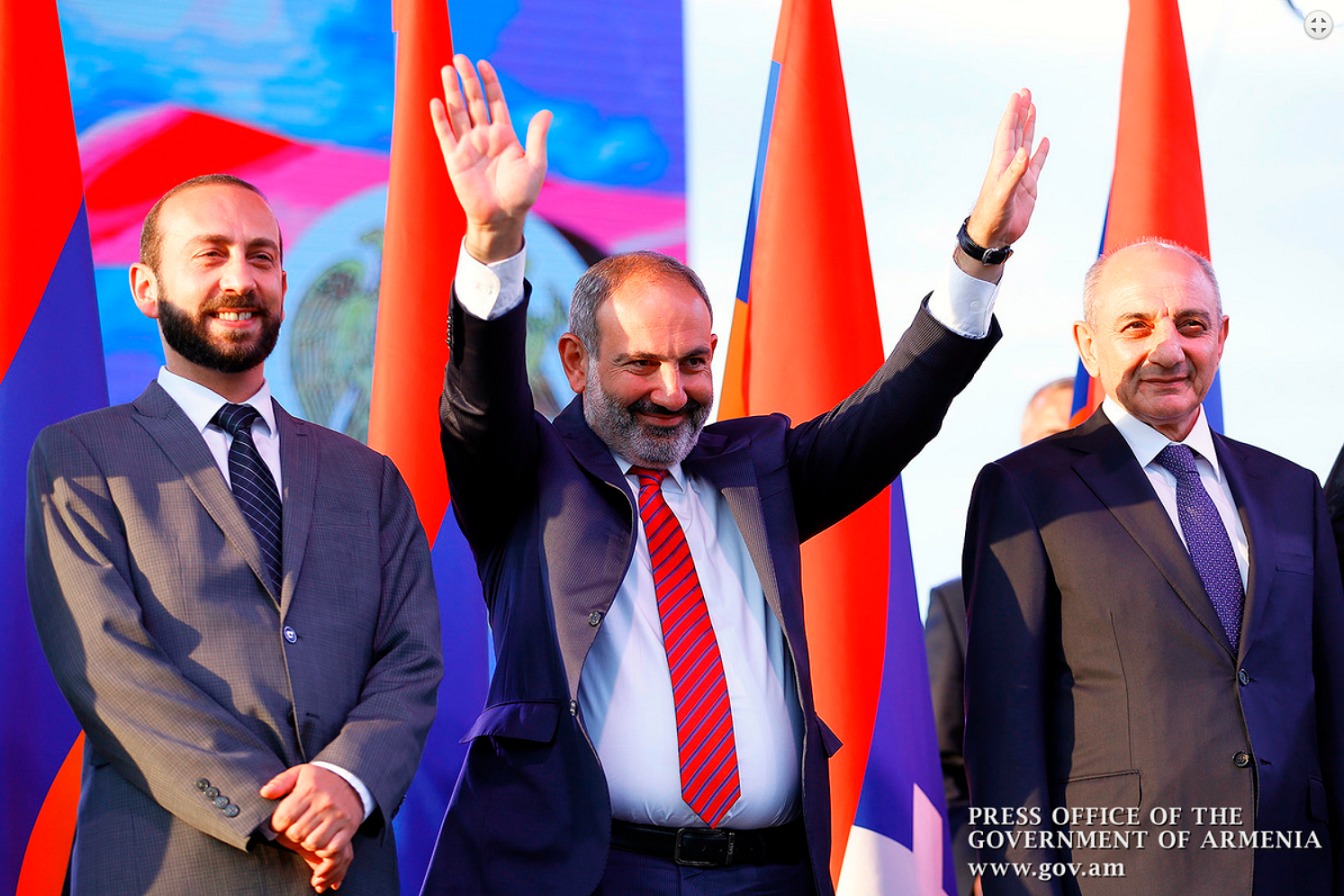
Armenian Prime Minister Nikol Pashinyan has called for ‘unification’ between Nagorno-Karabakh and Armenia, in a wide-ranging speech that was delivered amidst an atmosphere of tension between authorities in Yerevan and Stepanakert.
‘Artsakh [Nagorno-Karabakh] is Armenia, the end’, Pashinyan remarked, during a speech in Nagorno-Karabakh’s capital Stepanakert (Khankandi) on 5 August. The speech was met with wild cheers and applause from the gathered crowd.
The Armenian Prime Minister also led the crowd in a chant of ‘miatsum’ (unification).
Pashinyan made the speech during the opening ceremony of the Pan-Armenian Games, a multi-sport contest for ethnic Armenians from around the world.
The crowd’s response to Pashinyan came in marked contrast to their response to a brief speech delivered by Nagorno-Karabakh’s President, Bako Sahakyan, immediately prior. Sahakyan’s speech was met with a more muted response and occasional jeering.
The remarks have been dubbed by some international observers as a hardening of Pashinyan’s previous positions on Nagorno-Karabakh and have come amidst a growing rift between the authorities in Yerevan and Stepanakert.
The Azerbaijani authorities reacted angrily to the speech, insisting that the region was illegally occupied by Armenia and that Pashinyan’s comments endangered peace negotiations and were ‘hypocritical’.
On 7 August, the Ministry of Foreign Affairs of Armenia released a statement claiming that the Azerbaijani authorities were ‘unable to perceive’ the ‘context and content’ of Pashinyan’s speech, which simply spoke of promoting a ‘pan-Armenian agenda of unity’. ‘Armenia’s position on a peaceful settlement remains unchanged’, they added.
‘His risk paid off’
Tigran Grigoryan, an Armenian analyst present during the speech, wrote on Twitter that ‘the rally was a huge triumph for Pashinyan and an utter humiliation for #Artsakh/#Karabakh’s President Bako Sahakyan.’
‘It was thought that in Karabakh Pashinyan didn’t have the level of support he had in mainland Armenia. However, his risk paid off and all the myths are finally busted’, he added.
In May, the president of Nagorno-Karabakh, Bako Sahakyan, along with his predecessor Arkadi Ghukasyan, bailed out former Armenian President Robert Kocharyan from detention.
Kocharyan, who was accused of ‘subverting the constitutional order’, has been one of Pashinyan’s principal critics and political opponents since the 2018 Velvet Revolution that swept him to power.
The support offered to the ex-president by Nagorno-Karabakh authorities was sharply criticised by Pashinyan at the time.
It has been claimed by some opponents of the authorities in Nagorno-Karabakh that they are a part of a political conspiracy with deposed Armenian Prime Minister Serzh Sargsyan and his predecessor, Robert Kocharyan — both men are originally from Nagorno-Karabakh.
The first elections in Nagorno-Karabakh since the Armenian revolution, for both the presidency and the legislature, are scheduled to take place in 2020. However, a number of analysts have expressed scepticism of Pashinyan’s ability to dislodge the current authorities.
Armenia-based analyst Tatul Hakobyan told RFE/RL’s Armenian service that Pashinyan was attempting to bring ‘revolutionary winds’ to Nagorno-Karabakh. ‘But to say that Nikol Pashinyan is an acceptable figure for the Artsakh authorities and society, I cannot say such a thing.’
According to Hakobyan, the rally in Stepanakert did not match the size and scope of Pashinyan’s rallies in Yerevan and that Pashinyan still needed to overcome negative coverage of him in Nagorno-Karabakh which has painted him and his government of aspiring to ‘destroy the Armenian family, demolish the Armenian church, demolish traditional Armenian values, moreover, sell Artsakh’s lands’.
‘Vision 2050’
In addition to his comments on Nagorno-Karabakh, Pashinyan also used his speech to deliver a vision for Armenia in the coming decades.
Among a number of other ambitious promises, he pledged to grow Armenia’s population from three million to five million by 2050, increase GDP 15-fold, increase salaries seven-fold, and have at least 10,000 start-ups. He also called for Armenia’s national football team to become the best in Europe and the world.
He also praised investors from the Armenian diaspora, including some he had been at loggerheads with in the first months following the Velvet Revolution.
‘If Armenian capital does not have a homeland,’ Pashinyan said, ‘why do Samvel Karapetyan and Ruben Vardanyan invest millions of dollars in the Republic of Armenia?’
Samvel Karapetyan, whose brother was an MP under the former ruling Republican Party, is an Armenian–Russian billionaire who owned Armenia’s electrical grid until his company’s contract was terminated by Pashinyan’s administration in May 2018.
Ruben Vardanyan is another Armenian–Russian billionaire, who clashed with Pashinyan after the latter closed the Centre for Strategic Initiatives, a think tank which Vardanayan was closely involved with, in September 2018.
Escalation in rhetoric
Pashinyan’s call for the ‘unification’ — made without any concrete policy proposals — followed a relative thaw in the Armenia–Azerbaijan conflict over Nagorno-Karabakh.
In September, the two countries established a direct line of communication to help prevent lethal incidents along their borders as well as along the Nagorno-Karabakh line of contact.
In January, the authorities in Armenia and Azerbaijan pledged to ‘prepare [their respective] populations for peace’.
In Azerbaijan, the condemnation of Pashinyan’s comments came swiftly.
‘Armenia, at the prime minister’s level, insults and crushes international norms and principles, the UN Charter, the Helsinki Final Act and completely destroys the negotiation process on the settlement of the Nagorno-Karabakh conflict', Hikmat Hajiyev, the Head of the Foreign Policy Department at the Presidential Administration was reported saying by Azerbaijani news agency Trend.
Azerbaijan’s Foreign Ministry also responded to the statement by the Armenian Foreign Ministry, in which the Armenian Ministry claimed that Azerbaijan had ‘misunderstood’ the context of Pashinyan’s speech.
‘Despite the fact that his statement is primarily intended for internal audiences, it does not give him any reason to call for annexation of the Nagorno-Karabakh region of the Republic of Azerbaijan’, read the statement by Azerbaijan’s Foreign Ministry.
For ease of reading, we choose not to use qualifiers such as ‘de facto’, ‘unrecognised’, or ‘partially recognised’ when discussing institutions or political positions within Abkhazia, Nagorno-Karabakh, and South Ossetia. This does not imply a position on their status.




 7 August 2019
7 August 2019


